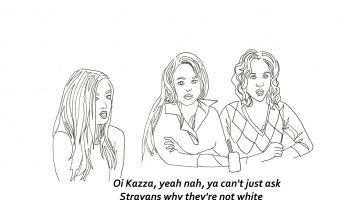Let’s imagine a couple. Sam and Taylor. They do all those couple-ish things together, like watching Game of Thrones every Monday. Trying to study but distracting each other most of the time. Sam picks Taylor up from work on Friday nights. Let’s say their first date was at the zoo. Alright, now in your mind, is this couple a man and a woman? If so, ever question why we generally default to heterosexual pairings like this? Well the sociologists that coined the term ‘heteronormativity’ certainly did.
Sociology aside, if you don’t identify as Queer or somewhere on the rainbow side of the spectrum, you’ve probably heard this word around Uni, but perhaps haven’t given it much more thought.
What are its implications then, beyond the deliberations of an Arts tute? Theory aside (because I promise this isn’t a lecture), I’ll give you some lived experiences of heteronormativity, from the perspective of a Queer, feminine-presenting woman, which will hopefully show to you just how pervasive and, well, shitty it is.
I can only speak for myself, but to me, heteronormativity is sheathed in the phrase, “But you don’t look gay”.
Which brings me to my second point: if someone comes out to you, and their appearance is not congruent with whatever idea you have in your mind of how a ‘gay’ person looks, please, do not follow up this moment by telling them that they “don’t look gay”. Or worse, that they are “too pretty to be a lesbian”.
These are not compliments. Among other issues, it elicits the bizarre notion that there is a certain way to look gay.
Although you might think you’re being complementary by pointing out a person’s similarities to the norm, comments like this can be really harmful to LGBTQIA folks.
When I first ‘came out’ my next worry was how to become visible within the community. I soon learnt that if you’re a Queer woman presenting on the more feminine side, you can often find yourself quite invisible in a lot of community spaces, especially if you don’t have a network of friends. Being told that I didn’t look gay enough added to the apprehension I was already feeling about wanting to fit into this new community I identified with.
Such issues of visibility and belonging manifest in a heteronormative system, where the default is heterosexual, and so everyone is presumed to be straight until they ‘come out’ or prove otherwise. Hence the dilemma for some of how to become visible.
Why the focus on heteronormativity? Acknowledging heterosexuality as the norm allows for us to see it as a political institution that first and foremost privileges heterosexuality. Your gender studies lecturer will probably term this a ‘hierarchy of sexualities’, because they see sexualities and the labels we use as inextricably bound to systems of power and privilege.
By making assumptions of a person’s sexuality based on their appearance and the way they dress, you are reinforcing heteronormativity. We all do it. I make these presumptions all the time, but I do try to make a conscious effort to unlearn these ways of thinking, and question its origins.
Many see heteronormativity as a product of a heterosexist society. And what is a heterosexist society? Well, heterosexism is simply this normative bias in favour of heterosexual relationships that permeates the attitudes and cultures of our society.
Having to reiterate to some people that, yes, despite my appearance I am indeed gay, becomes tiring. These appearance-based assumptions are unavoidably gendered as well, as much of these sceptical attitudes manifest in the idea that an overly feminine woman must be heterosexual. The comment that someone is ‘too pretty to be a lesbian’ also represents this common assumption that conflates appearance with sexuality, whereby lesbians are assumed to only date women if they are physically undesirable to men.
I have noticed that when I out myself to straight men I tend to label myself as ‘gay’ rather than ‘lesbian’. I find myself disassociating with the label lesbian because of the sexual connotations attached to it that indulge the male gaze. Queer sexual identities are so commonly sexualised, and as much as I take pride in identifying as a lesbian, sometimes it’s easier to use the label ‘gay’ for this reason. In my experience ‘gay’ seems to warrant less speculation, scepticism, or creepy interest. When I term myself as a lesbian, I have experienced that some straight men commonly see this as an invitation (“That’s hot”) – or alternatively think I’m an angry radical feminist that will spit on him and throw my burning bra in his direction. Don’t get me wrong though, I am angry 🙂
This may all sound a little embellished, but it does indeed happen. I was recently at a bar with some friends, and we were approached by two men who struck up conversation. Their way of deciphering which of us were potentially interested in them was to individually ask each of us, “You got a boyfriend?”
(Clearly they respected the idea of us being another man’s property more so than our own individual agency.) When the index finder swung in my direction, one of my friends proposed that I would actually have a girlfriend, which elicited raised eyebrows along with the trying-to-play-accepting-but-really-just-creepy comments of, “Really? That’s cool, I like that.” (To which I responded, “I’m sure you do” *eye-roll*.)
All in all, it would be nice if I didn’t find myself in these awkward encounters where I feel pressured to out myself to strangers. Most of the time, I choose not to. And for any peeved dudes reading this and thinking ‘not all men’, yes, I know not all of you are that appalling at talking to women in bars. Sadly I have also had other Queer people, including queer women, question my sexual identity based on my appearance. To me, these experiences are embedded in heteronormativity. I am presumed straight until I prove otherwise, based largely on my feminine or ‘lipstick’ appearance.
Thankfully I am now at a place where questions like “who pays on the dates?” just entertain me (with disdain). While the language you use and comments you make may seem benign to you, to some they can be really harmful.
At the very least, if you give no fucks for anyone but yourself, then be aware of the political power relations you are regurgitating. And at best, I have found that it’s important to be mindful of the troublesome norms we are perpetuating with what may seem like throwaway comments or harmless questions.
Rather than try to find ways in which my relationships mirror your own, or compliment me on how my appearance assimilates with your idea of femininity, allow me my differences. It’s time to understand that we are different, and accept us anyway.


